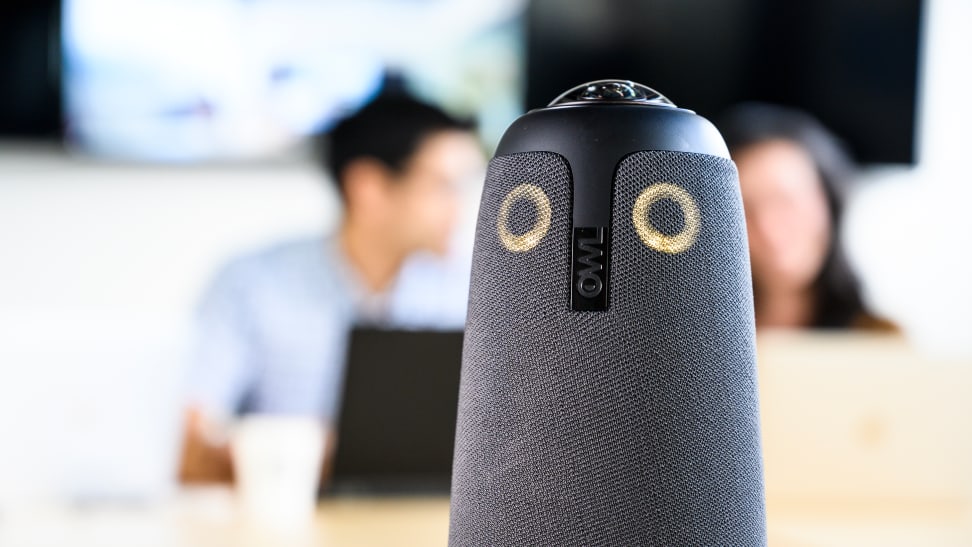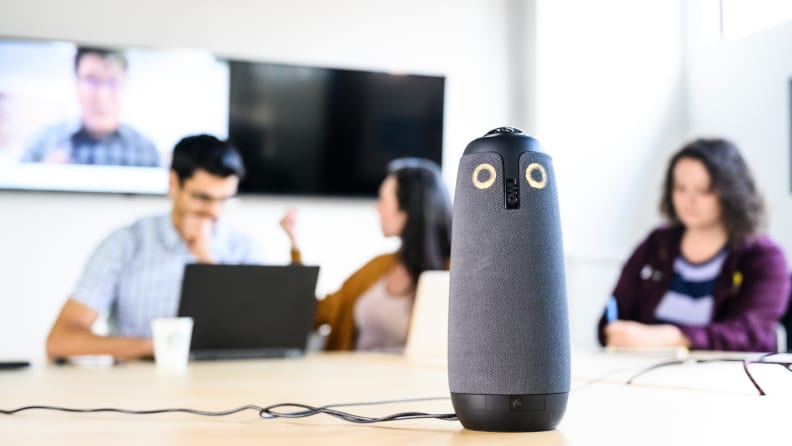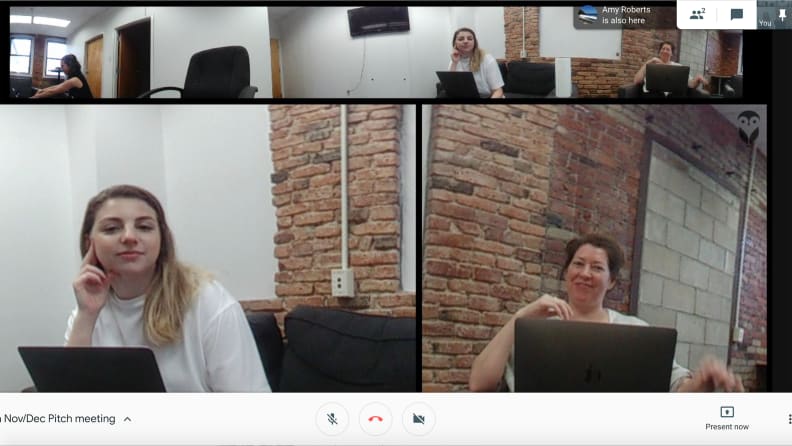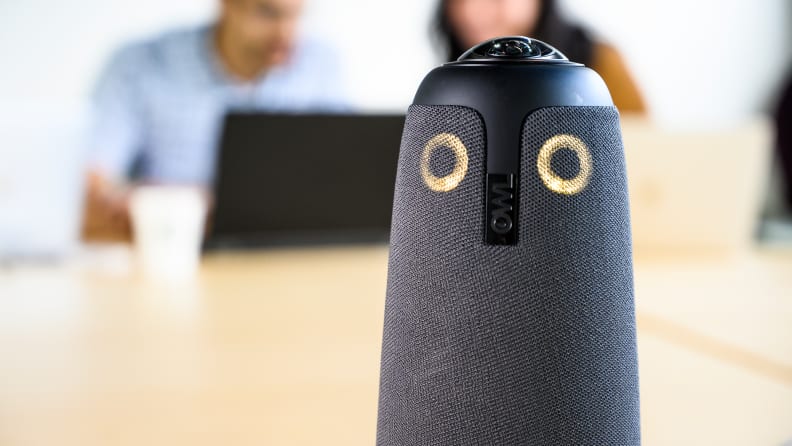We tried the camera that claims to make working from home better
Can this funny-looking camera device change the way you work?
 Credit:
Reviewed / Betsey Goldwasser
Credit:
Reviewed / Betsey Goldwasser
Products are chosen independently by our editors. Purchases made through our links may earn us a commission.
Whether you work in marketing, media, or mergers and acquisitions, it’s easier than ever to be a remote employee. This is great when it comes to personal convenience—how else can a person roll out of bed, throw on sweatpants and slippers, and still have more than enough time to be “present” for a 9 AM company meeting? The downside: You’re not actually present, which can sometimes cause a feeling of disconnect when your connections are limited to what WiFi typically offers: text chat, email, conference calls, and one-on-one video calls.
Meeting Owl, an office camera with features that claim to bring remote employees into the office, aims to change that.
What is a Meeting Owl?
The Meeting Owl, created by Owl Labs in Somerville, MA, is a speaker-camera combo intended as a way to integrate remote employees into meetings in a way a regular webcam cannot. It’s about the size of a medium vase, with a cylindrical shape that tapers slightly at the top. The camera, at the top of the cylinder, is designed to offer a 360-degree view of the room you’re in, and the Owl’s speakers, located in the middle of the cylinder, work with the camera to focus in on the people speaking, no matter where they’re located within the room. It sells for $799.
I work at Reviewed’s headquarters in Cambridge, MA, but our company has about 10 remote employees—including my editor, Amy Roberts, who lives in NYC—so we decided to test it out to see if it made things easier for everyone, whether remote or in the office.
How does it work for people in the office?

The Owl can help remote employees feel more integral to the room.
Pretty much all of the setup for the Meeting Owl happens inside the actual office. But that shouldn’t scare anyone who fears fiddling around with a bunch of wires and cables just for a quick call—if you can plug in a phone charger, you can set up the Meeting Owl. My tech skills are nothing special, and configuring the Owl doesn’t require advanced networking knowledge. All you have to do is use a USB cord to plug it into a laptop, switch the camera and microphone settings from your webcam to the Meeting Owl, and you’re good to go. (I did once delay an editorial meeting by about 15 minutes because I couldn’t get the sound to work, but that was only because I didn’t realize the Owl’s physical mute button was on, which I think can be firmly chalked up to user error.)
We used the Owl in our weekly editorial staff meetings for about two months. We also set it up in the conference room for other breakout meetings including fewer employees. It worked with our office’s primary means of video chatting, Google Hangouts, and supposedly works well as Slack, Zoom, Skype, GoTo meetings, and more. Our open-plan office is not the ideal space for the Meeting Owl—Owl Labs recommends users set it up for two to eight people in an enclosed space with a max of about a 12-foot diameter, and we used it in a much larger room with about 30 people—but it did about as well as it could in the space we gave it.
Of course, that was the perspective from inside the room. Once it’s set up and connected to a call, all is business as usual. You see the other person or people on the other end of the call, and they see (a more hi-res, sometimes trippy vision) of you. (More on that in a moment.)
That said, Meeting Owl does have a feature people inside the office can appreciate: When you turn it on and connect it to a video call, two pairs of orange “eyes” blink open to indicate the camera is in use. The eyes aren’t actually watching you—the recording is done by the camera at the top of the column, encased in a small glass dome—and it’s not the camera’s most important feature, but it’s pretty fun all the same.
How does it work for remote employees?

This is how a remote employee experiences the Owl.
Remote workers don’t have to do anything to make the Meeting Owl work, other than accepting a video call, but they see all its features (well, besides the glowing eyes). Its main feature is, of course, the panoramic view of the room it’s in—which, for us, gave remote employees a chance to see something other than our editor-in-chief’s face in his laptop’s webcam during editorial meetings. Its other main benefit is its ability to focus in on individual people when they start talking.
This mic-to-video focus conversion really works, both in its favor and against it. When the mic picks up a new person’s voice, they slide into the frame, sort of like the Brady Bunch opening credits, and sort of like the three-way call ambush scene in Mean Girls. Like the eyes, this isn’t much more than a novelty, but it’s a cool one nonetheless—unless, of course, you’re in a meeting where people’s voices overlap.
“As a visual person, I found it so much nicer to see into and around the room, especially to identify who was speaking by sight and not just by voice,” says my editor, Amy. “Most of the time, I appreciated the swivel the camera did to follow the sound, though sometimes (ahem, when people talked over each other), it got a little dizzying.”
Is it worth it?
Whether a Meeting Owl is worth it or not depends, like most things, on your office and its needs.
“It's not (in my eyes) for large-scale deployment in a managed IT environment,” says Dylan Prowse, Reviewed’s in-house operations manager. This is mainly because it says it’s sending out analytics, but doesn’t identify the data it’s sending. “Some networks might not like this or simply not allow it or refuse to open the (common) ports needed on their firewall or NSA device,” he says. Dylan also pointed out that the Owl has no pro tools for troubleshooting, which means it can be difficult for someone in an IT or support role to figure out what’s going on if the Owl isn’t working.
There is, too, the sliding around of meeting participants. Though fun, and maybe the closest way to approximate being inside a room while several hundred miles away, it can also be distracting. And some remote employees didn’t think it made that much of a difference, or that the improvements it offered—a better look at the people in the room—made way for other issues, like a queasy feeling when several people in the meeting spoke at once.
Finally, Owl is also highly dependent on the parameters laid out by Owl Labs. It works best when it’s completely unencumbered and placed squarely on a semi-elevated surface in the center of a meeting space. This doesn’t make it much different from most meeting cameras, but it made it, if not difficult, certainly not ideal to use in any space that wasn’t a traditional conference room. We sometimes hold meetings in a back room that feels more like an office lounge than a conference room, so setting up the Owl there ate up several minutes of one meeting. We tried to put it on a swivel chair, which caused an echo, a camera blockage, an Owl tumble, and some strained connections with the computer. That said, all it took to fix—dragging a coffee table to the middle of the room and placing the Owl there—was pretty easy. Once that was set up, it worked well.
Should you get it?

The Owl's eyes glow to indicate the camera is working.
Despite its quirks, the Meeting Owl has several undeniable benefits. It’s portable, which isn’t an option with mounted surveillance cameras. Also, it’s not too expensive—especially when compared to mounted corporate setups, which can cost thousands of dollars for a labor-intensive setup.
“Given its rivals in the market (the larger Polycom systems and the Logitech Rallys of the world) Owl is a plug-and-play situation and its price is pretty cutthroat,” Dylan says. “I am not sure I would deploy eight of them for $6,000 like their store suggests, nor do I think their USB cable is worth 15 bucks. [Meeting Owl sells a “replacement” USB cable for $15.] But I think the unit would be a pretty good fit for an office of under 100 users, while using a popular hosting software like Google Meet.”
